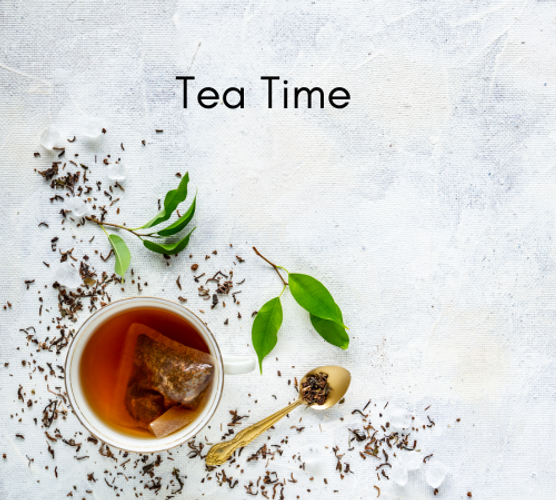Sip, Savor, and Unwind: Discover the Art of Black Tea Magic
Apr 10th 2024
- Boil 2 cups of water.
- Once the water has boiled, turn off the heat and add 2 teaspoons of black tea leaves.
- Let the tea steep for 3 - 5 minutes.
- Strain the tea and discard the tea leaves.
- Pour into a cup and add milk, sugar, or a slice of lemon, depending on your tastes.
The Black Tea: A Comprehensive Guide to Its History, Varieties, and Health Benefits

In the world of beverages, black tea takes a center stage. It's a staple in many households, finding its place in the morning routines, afternoon breaks, and soothing nightcaps of millions around the globe. But what is black tea exactly, and why should you consider incorporating it into your daily routine? Let's dive in and explore.
Unraveling the History of Black Tea
The story of black tea begins in the 17th century, in the tea-drinking heartland of the world - China. It was here that a fortuitous accident led to the birth of this dark, smoky brew we've come to love. Tea leaves, left out in the sun for too long, turned a deep shade of red due to overexposure to sun and oxygen. Instead of discarding these leaves, a local farmer decided to dry them over pine, leading to the creation of the first black tea, known as Lapsang Souchong.
This discovery that black tea could be stored for extended periods and even improved with age led to its popularity among traders. The British and Dutch battled over the precious leaves, with the British eventually sourcing the Camellia Sinensis plant, responsible for black tea, from India. This led to the development of various blends like the fragrant Earl Grey, the bright Orange Pekoe, and the famed Darjeeling tea.
Once a luxury reserved for the aristocracy and British royalty, today, black tea is one of the most widely consumed teas worldwide, with India, China, and Sri Lanka being the top producers.
Understanding the Different Varieties of Black Tea
Contrary to popular belief, black tea, white tea, and green tea all come from the same plant - the difference lies in the processing. Black tea undergoes more oxidation than other tea types, giving it a darker color and bolder taste.
The flavor of black tea can vary significantly based on where it's grown and how it's processed. Assam tea from India is known for its brisk, bold flavor. Darjeeling tea, often referred to as the "champagne of teas," is celebrated for its delicate, light flavor. Sri Lanka's Ceylon tea boasts a spicy, rich profile, while China's Yunnan tea delivers malty, chocolate-like notes.
![]()
Delving into the Health Benefits of Black Tea
Black tea isn't just a flavorful beverage; it's packed with potential health benefits that make it a worthwhile addition to any diet. One of the significant advantages of black tea is its high caffeine content. It contains more caffeine than other teas, but less than coffee, providing an energy boost without the crash.
Black Tea for Energy and Focus
Combined with small amounts of theophylline, a stimulant that can increase heart rate, the caffeine in black tea can help you feel more alert and focused. This makes it an excellent choice for those needing an energy boost to tackle a workout, a meal preparation, or a busy day at work.
Black Tea and Heart Health
Studies have shown that regular consumption of black tea can reduce the risk of heart disease by decreasing LDL cholesterol levels and other risk factors. This makes black tea a valuable ally in maintaining heart health and reducing the risk of cardiovascular diseases.
Black Tea for Gut Health
The polyphenols in black tea can promote good gut health by fostering the growth of beneficial bacteria and combating harmful ones. These antioxidants can also aid in weight loss and help soothe inflammation and irritation in the digestive system.
Black Tea for Lowering Stroke Risks
Research has also indicated that black tea consumption can lower the risk of stroke, making it a preventive measure against this severe health concern.
Black Tea for Blood Sugar Regulation
Black tea has been found to help regulate blood sugar levels, reducing the risk of type 2 diabetes. This makes it a beneficial addition to the diet of those looking to manage their blood sugar levels.
Black Tea's Role in Cancer Prevention
The thearubigins and theaflavins in black tea, which are rich in antioxidant activity, can slow cancer cell growth and protect cells from DNA damage. This suggests that black tea could potentially play a role in preventing certain types of cancer.
Black Tea for Skin and Hair Health
Beyond its internal health benefits, black tea can also contribute to external well-being. The antioxidants, tannins, and polyphenols found in black tea can help the skin heal faster, reduce puffiness, and even banish blemishes.
Black Tea for Improved Metabolism and Weight Management
Black tea has been found to increase metabolism, aiding in weight management. It also helps the body break down stored fat and increases energy flow, encouraging more physical activity, which, in turn, burns more calories.
Potential Side Effects of Black Tea
Despite its many benefits, it's important to consume black tea in moderation due to its caffeine content. Excessive consumption can lead to side effects like jitteriness, anxiety, sleep problems, headaches, increased urination, higher blood pressure, nausea, and tremors.

A Simple Black Tea Recipe
To reap the benefits of black tea, here's a straightforward recipe you can try at home:
Typically, black tea should be brewed for 3 to 5 minutes to extract the optimal flavor. Adjust the brewing time based on your preference for a stronger or milder taste.
To make flavored black tea, you can try the following recipe:
Ingredients:
1. 1 black tea bag or loose-leaf black tea
2.
Flavoring ingredients (e.g. sliced ginger, cinnamon stick, mint leaves, lemon peel, cloves, cardamom pods, or vanilla bean)
Sweetener (optional)
Instructions:
Bring water to a boil in a kettle.
Place the black tea bag or loose-leaf black tea in a teapot or mug.
Add your desired flavoring ingredients to the tea bag or directly into the teapot/mug.
Pour the boiling water over the tea bag and flavoring ingredients.
Steep the tea for 3 to 5 minutes, depending on your preferred strength.
Remove the tea bag or strain the loose-leaf tea.
Add sweetener, if desired.
Stir well and enjoy your flavored black tea!
Feel free to experiment with different flavor combinations to find your favorite flavored black tea!
Conclusion
With its rich history, diverse varieties, and numerous health benefits, black tea makes for a worthy addition to any diet. Whether you enjoy it hot and steaming, iced on a warm day, or creatively infused with other flavors, black tea can cater to a vast array of tastes. So, why not put the kettle on and savor a cup of this health-boosting brew?
Please Note: While this article highlights the potential health benefits of black tea, it should not be taken as medical advice. If you have any health-related concerns or queries, always consult with a healthcare professional.


